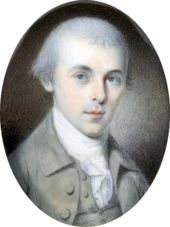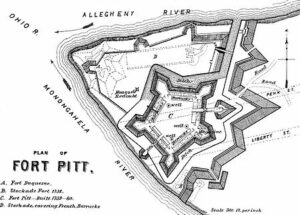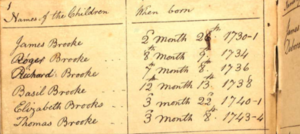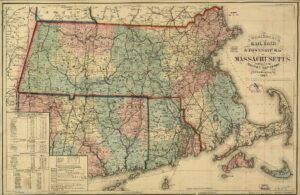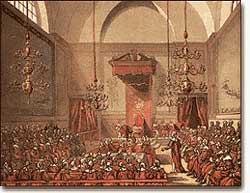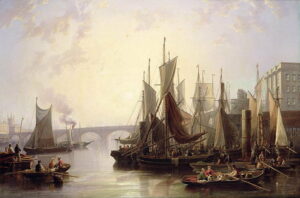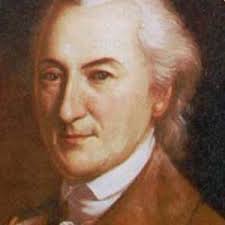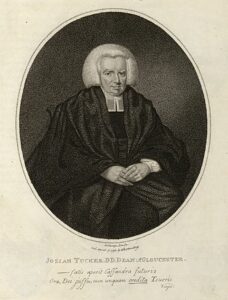Americanism Redux
April 4, your today, on the journey to the American Founding, 250 years ago, in 1774
(communication of the casual and natural)
Today, you meet your family, your friends, and the people who come and go as the minutes and hours tick by.
You talk with them, write to them. Behind the words are ideas in your head. Some are so old and familiar to you that they practically transmit themselves. Others are newer, still in seed.
The ideas push up through cold, wet soil. Soft and tender, they lay bent and battered in the sharp spring wind. They are pale in color, either green on the way to growth or yellow on the way to decay.
* * * * * * *
(Hannah Winthrop of Cambridge)
Hannah Winthrop thinks of her most cherished friend in terms she hears everyone using. Her friendship with Mercy Otis Warren is “our Charter of Friendship, Liberties, and immunities.” These are words with popular currency in the daily debates about the imperial-colonial crisis. They speak of contractual obligations, a mutual compact, things sacred and shared. Fundamental questions of governing and governed have now spread into the language of friendship.
Hannah praises Mercy’s role as her husband’s “helpmeet in the truest sense of the word.” She asks Mercy’s opinion as to who will become the new Chief Justice in their colony of Massachusetts—that’s the big issue Hannah regards as crucial in the coming days. She expresses the thrill she gets at public meetings when speakers talk of colonial rights with “Ciceronian” eloquence and inspiration. For Hannah, such moments show the value of education and learning, a view she’s certain Mercy shares with her.
“The hardy sons of Freedom have taken such resolute steps which will be applauded by future generations,” writes Hannah, as indeed they already have for this Cambridge woman and her language of friendship.
* * * * * * *
(James Madison)
James Madison also writes about the language of friendship in the social medium of mailed letters. He remarks in a letter to his friend William Bradford that an open expression of affection for each other “is a satisfaction and delight unknown to all who correspond for business or conveniency; but richly enjoyed by all who make pleasure and Improvement the business of their communications.”
Madison and Bradford share so great an admiration for a mutual friend, Hugh Henry Brackenridge, that Madison fears the rumors of Hugh’s fatal illness will mean removal of an irreplaceable “American” talent. The silencing of the Brackenridge mind, voice, and pen now would be tragic at a time when “America” needs them most. Only intimate friends know better than anyone the scale of such a loss.
Like Hannah Winthrop, James Madison integrates the political and public into his friendship letter. He tells Bradford that his home colony of Virginia is hostile to religious and civil rights, especially in comparison with Bradford’s Pennsylvania. He warns that the Virginians in power will stop at nothing to choke off the expansion of tolerance and diversity.
In honest exchanges with loving friends, James Madison in Virginia is less confident than Hannah Winthrop in Massachusetts in local prospects for positive change.
* * * * * * *
Not everyone in the colony of Virginia is as gloomy as Madison. Thomas Jefferson celebrates the one-day birthday of Jane, his second daughter with his beloved wife Martha. And Jefferson has a new professional colleague, St. George Tucker, a relocated resident of Bermuda, former law student of Jefferson’s, and the holder of a less-than-one-day old lawyer’s license in Virginia.
Father to a new life and associate to a new lawyer, Thomas Jefferson will be of two faces, one staring at continuity, one striving for change, in the colony of Virginia. The words he chooses for the decisions ahead will be nailed into one category or the other.
How far into Jane Jefferson’s childhood will she be surrounded by the words and phrases of governing and government?
How soon into St. George Tucker’s legal career will he be tested on his need to dissect words and phrases of governing and government?
* * * * * * *
(Pittsburgh’s layout)
Aeneas Mackay is in Pittsburgh, colony of…what and where? And that’s precisely the problem in his look at things because the royal governor of the colony of Virginia, Lord Dunmore, is on a quest, a mission, and a rampage to seize Pittsburgh and the upper reaches of the Ohio River valley on behalf of Virginia. Mackay sees “anarchy and confusion” throughout the isolated town at the forks of the Ohio. He’s watching Dunmore’s agent, Dr. John Connolly, talk his way out of a Pennsylvania jail, intimidate the sheriff appointed by Pennsylvania authorities, organize an anti-Pennsylvania 20-man armed militia, and begin appointing Virginia-favored residents as officers in a future militia unit. In Mackay’s opinion, Connolly is leading a local revolution in land ownership, governmental loyalty, and colonial identity. Mackay also observes that “the Indians (in Pittsburgh) are greatly alarmed at seeing parties of armed men patrolling through our streets daily, not knowing but there is hostility intended against them and their country.”
Walk the muddy streets of Pittsburgh and look for signs of people’s allegiance first and friendship second. Ask some questions and wait for their words—who’s the sheriff, who’s the judge, who’s the militia captain, and who is Dr. Connolly, a villain or a victor? The language will give them away.
* * * * * * *
(before he was a landowner)
You want the language to be as specific as possible in your land survey. James Brooke of Montgomery County, colony of Maryland, will testify to that. Today’s he is signing the final document of a survey of his land, outlining the size and shape of his property. The surveyors used their chains and rods and cords of rope to mark the ground from this tree to that tree, from this sapling to that hill crest, from a neighbor’s building here to another’s there.
Brooke signs the document with particular beliefs he attaches to the words. The local jurisdiction of county or town will record the results, the record will be acknowledged by officials in the colony’s capital seat of government, and the capital will have its governing offices and bodies rooted in the charter granted, one way or another, by imperial authorities in London and kept in obedience by the colony’s people here. That’s how it works.
The words have an appearance as well as a sound. It all seems so established in depth that you forget you’re seeing a surface or topside. Beneath the surface yet before the bottom is an underside of considerable size in a variety of conditions. The most surprising thing is how a simple combination of factors can break up the surface and rework below.
After all, on Brooke’s property, the trees can topple, the saplings can die, and the hills can erode.
* * * * * * *
(Colonies of Massachusetts and Connecticut)
Part of the surface is cracking in the colonies of Massachusetts and Connecticut.
In Boston the royal governor Thomas Hutchinson, target of hostility and criticism from colonial-rights supporters for the past few years, has resigned. He’s leaving Boston and heading for London. In his place, starting now, is British General Thomas Gage, an active officer in the British Army and veteran of the French and Indian War from 1754 to 1763. The man perceived as the embodiment of imperial excess and overreach is now gone. Are better days ahead?
In Hartford the Connecticut Journal prints for public reading the private letter that Phillis Wheatley wrote to Samson Occum several week before. The newly un-enslaved black teenage poet and writer had communicated to the Native Christian evangelist and activist that she believed every person had an inner spirit of liberty. Beating deep in the individual heart was the universal desire of a human being to pursue his or her fullest potential without fetters or chains. Will freedom ring?
In Nantucket, a ship puts out to sea. It’s the vessel Dartmouth, now empty of the East India Company tea that had been seized and dumped into freezing Boston harbor back in mid-December. The Dartmouth is London-bound, carrying whale oil and a man named Francis Rotch who is planning to speak with Lord Dartmouth of the British imperial government about his first-hand witnessing of December’s tea dump. How far will punishment go?
* * * * * * *
It’s not hard to see how New Englanders like Hannah Winthrop have the ideas of governing and government affecting their understanding of friendships. The imperial-colonial crisis has spread into many areas of daily life. Will the same be true for people living outside New England?
Also
King George III has approved Parliament’s passage of the Boston Port Act. As of June 1—roughly eight weeks away—the port of Boston will be closed to all sea-going and water-borne traffic. Violators will have their goods and items seized and removed. Enforcement will be the joint responsibility of imperial trade vessels and ships of the Royal Navy. Boston’s residents will be expected to reimburse the British East India Company and all other affected people for losses incurred during the anti-tea protests conducted by “dangerous connections and insurrections.” A new clock has started with the law’s June 1 start date.
In language strikingly similar to the land survey done for James Brooke of Maryland, the Boston Port Act includes detailed descriptions of bodies of water, the shapes of bays and inlets, and the slopes of hills.
* * * * * * *
(arguing)
While ink dries on enactment of the Boston Port Act, debate continues in Parliament on governmental practices and culture in the colony of Massachusetts. The pro- and con-sides of argument reveal sharp differences of opinion and analysis; a consensus is not immediately evident. Meanwhile, George III’s prime minister, Lord North, selects members of Parliament for a special committee to examine the past ten years of colonial unrest, resistance, and protest in America. The rationale behind the committee’s work is that a higher-level analysis may point to new ideas for addressing the imperial-colonial crisis.
* * * * * * *
(vulnerable spot?)
English reaction to Parliament’s passage of the Boston Port Act is uniformly positive. The vast majority of people interested in imperial policy and politics approve of it. At the same time, there are expressions of uncertainty among some English merchants, offering a possible opening for future revision of the law; the merchants fear a colonial movement to resist the law through the banning of trade between the mother country and colonies.
* * * * * * *
(John Dickinson)
A colonial observer in London believes the majority of Parliament wants to punish not only Boston and Massachusetts but all of the colonies. This observer writes to advise John Dickinson, a resident of Philadelphia, the wealthiest man in colonial America, and arguably the most influential colonial-rights leader over the past decade. The writer urges Dickinson that “the wise and prudent” will convince colonial protestors to refrain from violence and channel their energies into peaceful forms of resistance. The writer calls for a general congress to meet and target England’s merchant class.
* * * * * * *
(Josiah Tucker)
In London, the Christian minister Josiah Tucker has published the latest of his series of books entitled “Four Tracts.” This is Tract IV. In it he lists five options for addressing the current imperial-colonial crisis. The option he prefers is to let the American colonies separate from England, yet retain a loose trade and cultural connection to the former mother country. To Tucker, the best of all worlds is to design and execute a planned, purposeful separation between England and its American colonies. No fuss, no mess, no chaos, no bloodshed.
For You Now
(adjacency)
It’s a revealing measurement when someone like Hannah Winthrop starts talking about friendship in terms that sound like a debate over constitutionalism and political philosophy. That shows you have deeply political and governmental ideas have sunken into daily life, at least in New England. Ask yourself this: what has to be true for that to be true? And does it suggest anything as a stage or platform for upcoming events?
There’s an adjacency here, too. In addition to Hannah Winthrop’s words about friendship, we have James Madison’s lament about the potential death of his friend Hugh Henry Brackenridge. Would Madison emphasize the regrettable loss to “America” from a possible Brackenridge death if there wasn’t an imperial-colonial crisis? Or would it be a regrettable loss, by itself, without attachment to an American implication? You can’t help but think that Madison feels the stakes are being raised in the context of rapidly deteriorating relations between England and its American colonies. Madison and Winthrop are adjacent to each other.
I think that’s a word for us to consider—adjacency. The presence of a fundamentally serious problem makes for other problems in areas linked, connected, or adjacent to it. Adjacency is a growing reality for people 250 years ago today.
Suggestion
Take a moment to consider: if you are concerned with the state of the American nation as a whole, is there another issue or point adjacent to it that gives you additional reason for concern? Or is adjacency getting out of hand?
(Your River)


